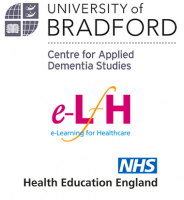Pharmacological Interventions in Dementia Care for Medical Doctors



This session will investigate the most common medications prescribed for people living with dementia, including their risks and benefits and the importance of regular recorded reviews.
Learning Objectives
By the end of this session you will be able to:
- List the most common medications prescribed for people living with dementia
- Describe the main risks and benefits of using a range of anti-psychotics, antidepressants, anxiolytics, anticonvulsants and cognitive enhancers
- Recognise issues with regards to polypharmacy for people living with dementia
- Explain the importance of recording and reporting side-effects and/or adverse reactions to medication
- Describe how to administer and review medication safely and appropriately in consultation with people affected by dementia
This session will investigate the most common medications prescribed for people living with dementia, including their risks and benefits and the importance of regular recorded reviews.
This session has been mapped to the Dementia Training Standards Framework and is designed to support the Dementia Action Alliance Dementia Statements.
Before commencing this session you may wish to complete:
- Module 1 – Introduction to Living with Dementia/Dementia Awareness (407-0030)
Hadar is a Senior Lecture in Pharmacy at the University of Bradford and has worked at various NHS Mental Health service providers in his career. Hadar is currently the lead Pharmacist for Medicine Safety for one of the largest third sector organisations providing mental health services in the North West of England.
Hadar has a varied research background and has undertaken several systematic reviews which have been used to inform clinical guideline development nationally and internationally. Hadar, through his experience and practice, provides specialist professional and clinical advice to the Care Quality Commission and regularly participates in inspections. Hadar has worked on expert advisory groups for the Medicines and Healthcare products Regulatory Agency and is a member of The National Institute for Health and Care Excellence serving in the Centre for Guideline Development.

- 03_06_10 ECG III
- Posted By eIntegrity Healthcare e-Learning
- Posted Date: 2024-11-02
- Location:Online
- This third and final session about the ECG discusses cardiac conduction and arrhythmias.
- 03_06_09 ECG II
- Posted By eIntegrity Healthcare e-Learning
- Posted Date: 2024-11-02
- Location:Online
- This session follows on from ECG I and presents the ECG as an electrical map of the heart. It details the abnormalities expected with myocardial infarction and left ventricular hypertrophy.
- 03_06_08 ECG 1
- Posted By eIntegrity Healthcare e-Learning
- Posted Date: 2024-11-02
- Location:Online
- This session explains how to record an ECG, the structure of the ECG and how to interpret the results. It further explains the use of the ECG in clinical practice.
- 03_06_07 Pulmonary function test interpretation
- Posted By eIntegrity Healthcare e-Learning
- Posted Date: 2024-11-02
- Location:Online
- This session will describe some of the basic respiratory investigations, and explain the relevance of the results obtained.
- 03_06_06 An alternative approach to acid-base abno...
- Posted By eIntegrity Healthcare e-Learning
- Posted Date: 2024-11-02
- Location:Online
- This session contains a link to the BJA Education article followed by a series of self assessment multiple choice questions.<br><br>The article will open in a new window or tab depending on your browser.<br><br> CPD credits are awarded by the RCoA for the







